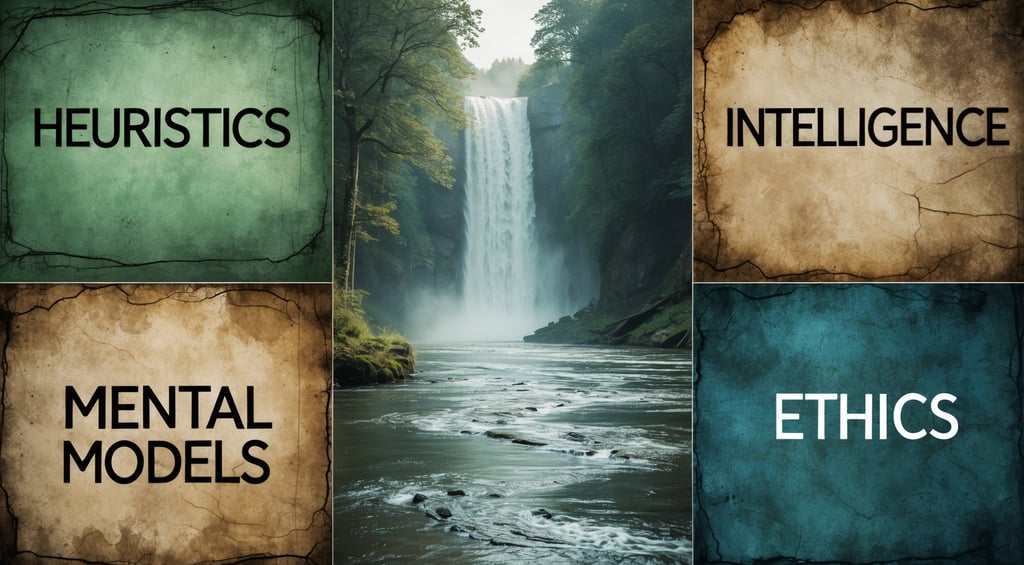Heuristics, Ethics, and Humanity
A Few Observations of Mental Models & Cognitive Shortcuts
4FORTITUDEU - UNDERSTANDING, COGNITION, PSYCHOLOGY, PERSPECTIVE
Heuristics, Ethics, and Humanity
The Power of Heuristics in a Complex World
In a world saturated with information and infinite choices, decision-making can be daunting. From navigating moral dilemmas to interpreting theological doctrines, our capacity to discern truth and act decisively is often constrained by time and uncertainty. Enter heuristics—mental shortcuts that guide human reasoning in complex scenarios. While often dismissed as simplistic or biased, heuristics are essential tools for flourishing in unpredictable environments. For men seeking to lead virtuous and resilient lives, understanding how heuristics shape human thought across domains is both practical and profound.
This article explores heuristics across five philosophical categories: Artificial Intelligence, Morality and Ethics, Epistemology, Ontology, and Theology. We will examine how these mental models influence our decision-making and how they can be refined for greater wisdom. Along the way, we will challenge conventional thinking with contrarian perspectives and pose deep questions to stimulate critical reflection.
Heuristics in Artificial Intelligence: The Pursuit of Efficiency
The Balance Between Accuracy and Efficiency
In the field of Artificial Intelligence (AI), heuristics play a vital role in reducing the complexity of problem-solving. Algorithms like the A* pathfinding algorithm use heuristic functions to estimate the most efficient path to a goal. These shortcuts help machines navigate vast search spaces without exhaustive computation. You don't need to know what this is, just that it is a well-known shortcut underpinned with an assumption of general usefulness that typically works...just like your go-to assumptions in your life that often, but not always, serve you well.
This raises a critical philosophical question: Should we prioritize efficiency over accuracy? Heuristics sacrifice precision for speed. In human decision-making, this trade-off can lead to biased judgments, but it also enables quick, practical solutions in high-pressure situations.
The Dangers of Heuristic Dependency in AI
Critics argue that relying on heuristics in AI can lead to unintended consequences. If algorithms inherit human biases embedded in heuristic models, they may perpetuate discrimination and inequality. For example, AI systems used in hiring might favor candidates who fit traditional stereotypes of competence, reinforcing systemic biases rather than eliminating them.
Additionally, AI-driven heuristics can oversimplify complex human behaviors. Predictive policing, for instance, uses heuristic models to assess crime risk, but such models have been criticized for reinforcing racial and socioeconomic disparities. The very efficiency that makes AI heuristics useful can also make them dangerously rigid and unaccountable.
For men navigating complex decisions—whether in business, relationships, or self-improvement—the key is recognizing when a heuristic suffices and when deeper analysis is required. Know when to trust your intuition and when to slow down for critical reflection.
How do you balance the need for quick decision-making with the moral responsibility to ensure accuracy and fairness?
Heuristics in Morality and Ethics: The Role of Moral Shortcuts
Practical Morality in Everyday Life
In ethical decision-making, heuristics provide practical guidelines for navigating complex moral landscapes. The "Golden Rule" heuristic—“Do unto others as you would have them do unto you”—simplifies moral reasoning by encouraging empathy and reciprocity.
However, moral heuristics can oversimplify complex situations. Consider the ethical implications of war, self-defense, or justice. Can we rely on simple moral rules in such cases, or do we need a more nuanced framework? Moral heuristics function as starting points, but wisdom lies in knowing when to adapt them to specific contexts.
The Limits of Moral Heuristics
A contrarian might argue that moral heuristics can lead to moral relativism or moral absolutism. In some cases, the Golden Rule may fail to address asymmetrical power dynamics, such as when one person's desires or values conflict with another’s.
Example: A pacifist may believe in non-violence (following the Golden Rule), but does that heuristic hold when defending one’s family from an aggressor? Similarly, strict adherence to moral shortcuts can lead to paralysis when confronted with ethical dilemmas that demand deeper reflection.
Men seeking to live virtuously must recognize the limitations of moral heuristics. Moral strength lies in discerning when rules apply and when exceptions are necessary.
How do you adapt moral principles to fit complex, real-world situations without compromising your integrity?
Heuristics in Epistemology: The Pursuit of Knowledge
Heuristics in Truth-Seeking
In epistemology, heuristics guide how we acquire and validate knowledge. The representativeness heuristic helps us categorize new information by comparing it to familiar patterns. This cognitive shortcut aids in quickly assessing credibility but can also lead to stereotyping or confirmation bias.
For men striving to build a legacy of wisdom and understanding, it is crucial to refine these mental shortcuts. Are we truly seeking truth, or are we merely reinforcing our pre-existing beliefs?
The Heuristic Trap
Some argue that epistemological heuristics can hinder intellectual growth. By relying on shortcuts, we risk missing novel ideas or revolutionary insights that lie beyond familiar categories.
Consider how Galileo challenged the prevailing geocentric model of the universe. If he had relied on the heuristics of his time, he would have never questioned the orthodoxy.
Cultivate intellectual humility. Be willing to question your assumptions and challenge established heuristics in your pursuit of knowledge.
What mental shortcuts do you rely on to validate knowledge, and how might they be limiting your understanding?
Heuristics are powerful cognitive tools, shaping our decisions in AI, ethics, and epistemology. However, these mental shortcuts must be refined rather than blindly followed. The wise man understands when heuristics serve him and when they lead him astray.
Practical Concepts to Remember and Apply:
Heuristics offer efficiency but must be refined for wisdom.
Moral heuristics simplify ethical dilemmas but require contextual application.
Intellectual humility prevents heuristic traps in knowledge-seeking.
Avoid rigid ontological labels that limit growth.
Faith heuristics provide guidance but should be coupled with theological reflection.
"The greatest enemy of knowledge is not ignorance, it is the illusion of knowledge." – Socrates
"It is the mark of an educated mind to be able to entertain a thought without accepting it." – Aristotle
Practical wisdom requires understanding the limits of heuristics. The virtuous man refines his mental shortcuts, challenges assumptions, and seeks truth relentlessly. In a world of complexity, he does not simply react—he discerns, adapts, and flourishes.
Expanding the Role of Heuristics in Virtuous Living
We've explored how heuristics shape our decision-making in Artificial Intelligence, Morality and Ethics, and Epistemology. These mental shortcuts allow us to navigate complexity efficiently, but they also pose risks when left unexamined. Now, in Part 2, we expand our focus to Ontology, Theology, Strategy, and Leadership—domains where heuristics influence our identity, beliefs, strategic thinking, and ability to guide others.
A virtuous man must master the art of adaptive heuristics—knowing when to trust his instincts and when to challenge them. As we continue this journey, we will explore how heuristics shape our understanding of reality, guide spiritual insights, refine strategic thinking, and define leadership excellence.
Heuristics in Ontology: Navigating Reality and Identity
Simplifying Complex Ontologies
Ontology—the study of existence—relies on heuristics to categorize and make sense of reality. The heuristic "If it quacks like a duck, it must be a duck" simplifies classification but risks overgeneralization.
In practical terms, men must navigate their roles as fathers, husbands, and leaders. What ontological assumptions underlie your identity? Are you categorizing yourself too narrowly? Consider how shifting societal norms challenge traditional identity heuristics. A man who defines himself only by external roles may find himself lost when those roles shift.
Ontological Rigidity as a Barrier to Growth
Rigid ontological heuristics can stifle growth. Labels like ‘man,’ ‘leader,’ or ‘provider’ can become limiting if they are treated as fixed categories. A contrarian perspective urges men to embrace fluidity in their identities while remaining rooted in core values.
Avoid rigid self-categorization. Seek to evolve your understanding of yourself and others while staying grounded in virtue and purpose.
How do your ontological assumptions shape your identity, and are they helping or hindering your personal growth?
Heuristics in Theology: Faith and Divine Interpretation
Heuristics in Spiritual Practice
In theology, heuristics like “Trust in God’s plan” help believers navigate the mysteries of life and faith. These mental models provide comfort and guidance in times of uncertainty.
However, blind reliance on theological heuristics can lead to dogmatism or passivity. Faith must be balanced with reason and personal responsibility. Historical figures such as Augustine and Aquinas emphasized the importance of both faith and rational inquiry.
Questioning Divine Heuristics
A contrarian might challenge the notion of divine heuristics by asking: Is faith a crutch? If heuristics simplify theology, are they diminishing the complexity of the divine? The problem of evil raises questions about the heuristic “God is good.” Can this heuristic hold in the face of suffering?
Strengthen your faith by engaging in theological reflection. Don’t just follow religious heuristics—seek their deeper meanings.
How do your theological heuristics shape your worldview, and are they helping you grow spiritually?
Heuristics in Strategy: Decision-Making in Uncertainty
The Power of Strategic Shortcuts
Heuristics in strategy help individuals and organizations navigate uncertainty. The OODA Loop (Observe, Orient, Decide, Act) is a prime example of a heuristic that enables quick and adaptive decision-making in combat, business, and life.
A virtuous man must develop strategic heuristics that allow him to assess threats, opportunities, and consequences rapidly while ensuring his actions align with his values.
The Risk of Over-Reliance on Heuristic-Based Strategy
A rigid commitment to strategic heuristics can lead to predictable patterns, making one vulnerable to opponents who understand their decision-making patterns. Great leaders and warriors—like Sun Tzu and Napoleon—knew that while heuristics provide a framework, adaptability ensures victory.
Develop adaptable heuristics that allow quick decision-making but refine them as new information emerges.
When do you trust your instincts in decision-making, and when should you pause to reevaluate your strategy?
Heuristics in Leadership: Guiding Others with Wisdom
The Heuristic of Authority and Trust
Leadership relies heavily on heuristics. A leader is often judged by simple cues: confidence, decisiveness, and clarity of vision. These mental shortcuts help followers assess whether someone is trustworthy and competent.
However, effective leadership requires more than projecting authority—it demands genuine wisdom. A leader must cultivate heuristics that inspire trust without falling into the trap of empty rhetoric.
The Dangers of Oversimplified Leadership Heuristics
Over-reliance on leadership heuristics can lead to blind followership—where charisma is mistaken for competence. History is rife with examples of strong, confident leaders whose poor decision-making led to disaster.
Develop leadership heuristics based on virtue, integrity, and competence—not just appearance and perception.
How do you ensure that the leadership heuristics you rely on are grounded in substance rather than superficiality?
Heuristics as Tools for Virtuous Living
Heuristics are not merely cognitive shortcuts; they are practical tools for navigating life’s complexities. Whether in AI, ethics, epistemology, ontology, theology, strategy, or leadership, they offer valuable insights into how we think and act.
However, men seeking to live virtuously must be vigilant. Challenge your mental models. Recognize when heuristics serve you and when they limit your growth.
Practical Concepts to Remember and Apply:
Heuristics offer efficiency but must be refined for wisdom.
Moral heuristics simplify ethical dilemmas but require contextual application.
Intellectual humility prevents heuristic traps in knowledge-seeking.
Avoid rigid ontological labels that limit growth.
Faith heuristics provide guidance but should be coupled with theological reflection.
Strategic heuristics should be adaptable, not rigid.
Leadership heuristics should be rooted in virtue, not just perception.
"It is not wisdom but authority that makes a law." – Thomas Hobbes
"The function of wisdom is to discriminate between good and evil." – Cicero
Practical wisdom requires understanding the limits of heuristics. The virtuous man refines his mental shortcuts, challenges assumptions, and seeks truth relentlessly. In a world of complexity, he does not simply react—he discerns, adapts, and flourishes.
Mastering heuristics means knowing when to trust them and when to transcend them. The path to wisdom is not found in blindly following shortcuts, but in understanding the road they illuminate.




